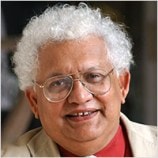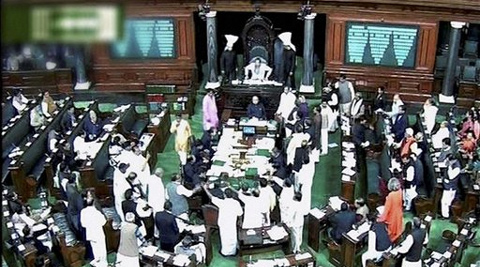Is Parliament necessary?
Meghnad Desai | February 23, 2014 3:12 am
SUMMARY
No ruling party wants Parliament to function. Let them riot, but to not legislate is the mantra.
Parliament functioned much like its British counterpart for the first 24 years after Independence. (PTI)
The blackout of the live transmission of the Lok Sabha debate on the Telangana Bill was the least shocking aspect of the entire exercise. Nor was the behaviour of the rival factions of Andhra MPs, pepper spray or not, difficult to explain. Indeed, one explains the other. In no other Parliament of a major democracy could a Bill with so much at stake be passed without more than a perfunctory debate or without a single vote count on something like 110-plus amendments. A topic which has been debated in the public, required a commission, caused suicides and much damage to public property, and on which strong views were held by rival sides, would never have been passed with such ease if there had been a genuine legislative chamber.
The truth, however, is that India’s Parliaments have been rendered non-functional — not by rowdy MPs but by the executive which has concentrated total power in its hands. The executive controls the business and the procedure of the legislature. When it comes to discussing a Bill, it is done off the floor of the House and between the leaderships of the major parties in secret. Thus late as the Telangana Bill came to the Lok Sabha, the discussion of all the amendments which were acceptable to the UPA was carried out between the Congress and BJP in a secret conclave. What was presented to Parliament was pre-cooked and predetermined to pass. This is why a voice vote was enough to pass the agreed upon amendments and to reject the rest without any debate. Why just that day, on any other day you could blank out the live debate in Parliament and nothing will be lost. Parliament does not debate legislation any longer. What happens is that the leadership of the major parties meets outside and determines in a give and take bargain what will be allowed to go through and what not. Parliament as such is impotent and irrelevant to any systematic debates.
It was not always thus. Parliament functioned much like its British counterpart for the first 24 years after Independence. There were major debates and historic speeches made on the floor of the House. Listen to the debates on India’s policy on China or recall Annadurai’s speech in 1962 where he told North Indians that the South was going to secede. Members could disagree with their party’s policy as British MPs can and frequently do. A Bill regarding the bifurcation of a state would take at least three months in each House in the UK. India retains the pretence of a parliamentary system, but does not have substance anymore.
This position has been evolving since Indira Gandhi began to concentrate executive power in the hands of the prime minister after her re-election in 1971. Later, when frequent defections became a problem, anti-defection laws were passed and the Ninth Schedule sounded the death knell for the independence of backbench MPs. An Indian MP has to obey the chief whip’s command. Most of the time, he/she is not allowed to speak if they are in disagreement with the position of the party. Bills are amended in standing committees and then brought before Parliament, where they are passed on the nod. The MP is thus impotent, and, except as a bodily presence, not doing much.
The only way an MP can register a disagreement is to stop Parliament from functioning. A lot of the time MPs misbehave under orders from their whip when their party does not want some piece of legislation to be introduced since, once a Bill is allowed to be introduced, it is guaranteed to pass. This is why Samajwadi Party MPs rioted when the Bill to secure reservations in promotions for the Dalits was about to be introduced. Or they riot as a bargaining ploy for their party vis-a-vis the ruling party. When the MP’s party is in power, as happened with Congress MPs from Andhra Pradesh, the only recourse is rioting. This was well anticipated by the Congress and used to squeeze last-minute concessions from the BJP to pass the Bill.
No ruling party wants Parliament to function. Let them riot, but to not legislate is the mantra.

